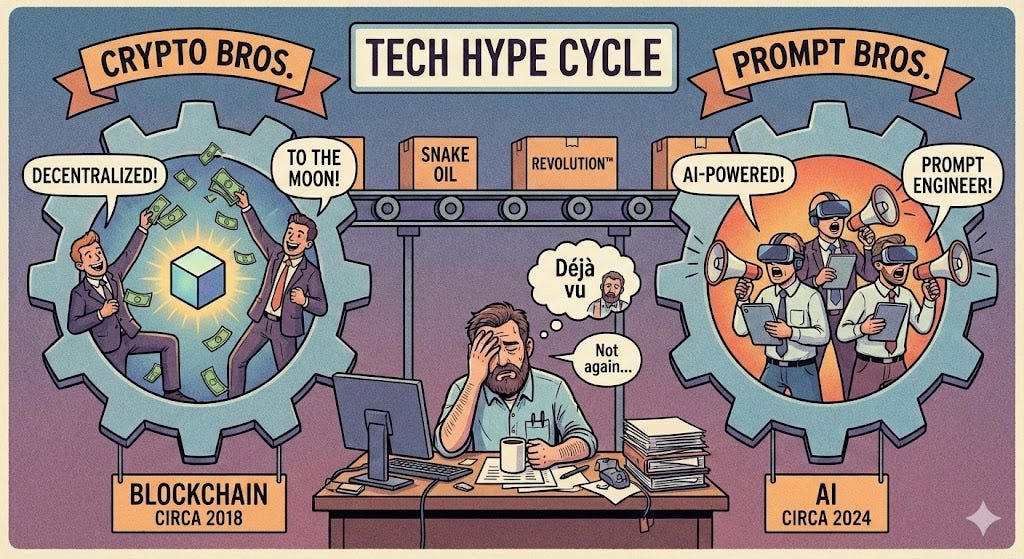AI is the new blockchain
If you’ve been around tech long enough to remember when your LinkedIn feed turned into a blockchain-infused carnival, you are about to experience a déjà vu.
As software engineer and tech dude, I’ve lived through both hype cycles. And today, watching the AI frenzy, I keep asking myself: Did we learn anything at all?
Spoiler: No. Absolutely not.
The script has been copied, pasted, and fine-tuned with only minor modification.
Let me walk you through the five analogies I see between AI and blockchain and let me explain why.
1. The hype machine is back, louder than ever
Remember when “blockchain” was sprinkled everywhere like parmigiano (that’s a freakin’ nice cheese btw) on an overpriced bowl of pasta? Well, AI is the new parmigiano.
Every product pitch includes “AI-powered” the way 2018 pitch decks slapped “decentralized” on everything from supply chains to sandwich makers. Social media is drowning in AI demos, AI explanations, AI-powered toothbrushes, AI CEOs, AI girlfriends, AI that writes code, AI that writes poems about code, and AI that explains the poem that wrote the code. LOL
The hype isn’t just big — it’s industrial-sized. Like blockchain, AI has become a marketing strategy, not a technology.
2. Speculation from folks who have no idea how any of this works
Blockchain had “crypto bros.”
AI has “prompt bros.”
Both groups share one thing: unshakable confidence built on unshakable ignorance.
Back in the blockchain days, people who had never implemented a hash function were lecturing us about Merkle trees.
Today, people who’ve never written a single line of ML code claim LLMs ‘understand everything’ just because one wrote them a cute poem without calling the moon a vegetable.
In both cases, speculation fills the void where knowledge should be.
And the less people know, the louder they get (this is true pretty much everywhere these days… it must be the social media side-effects we really did not consider 15 years ago).
3. The “ambassadors” who won’t just STFU
Yes, the evangelists.
Blockchain gave us self-appointed gurus promising a decentralized utopia.
AI gives us “AI influencers” declaring that prompting is a new profession and that thinking itself is obsolete.
Every social platform now has armies of creators yelling “AI is going to replace 99% of jobs!” or “Prompt engineering is the future!” or “If you’re not learning AI right now you’re basically in the Stone Age!”
Just like with blockchain, the evangelism scales faster than the technology.
4. (The real) engineers calling it all “stupid” (while being uncomfortably right)
Every time a hype cycle reaches critical mass, actual experts emerge from their caves, blinking at the sunlight, saying:
“This is dumb.”
Blockchain engineers warned that most use cases were pointless. They were right.
AI practitioners today warn that LLMs are glorified autocomplete engines (yes, myself included), not reasoning machines. They’re right too.
And the polarization is nearly identical:
The undereducated: “This is revolutionary! It will change everything!”
The highly educated: “This is nonsense. It won’t work for half the things you want it to do.”
(There are exceptions though. But when you give them a Nobel Prize their excitement might blur their true opinion and make it less authentic)
Two tribes. No middle ground. Same movie, different cast.
5. The scaling problem
Blockchain was slow, expensive, and environmentally catastrophic. It still is.
AI — specifically LLMs — shares the same terminal flaw: it doesn’t scale.
Training costs are astronomical.
Inference costs are non-trivial.
Even the biggest models still confidently hallucinate (because that is intrinsic with statistics).
And the computing demands grow faster than our ability to supply them.
Both technologies are brilliant research achievements… that hit a wall the moment the real world asks them to serve billions of users.
We’re building cathedrals on top of very expensive sand.
So why do we repeat the cycle?
Because every few years, tech promises a revolution. We want it to be true. We want to believe that the next technology will finally solve productivity, inequality, bureaucracy, creativity, and perhaps loneliness.
But technologies don’t fix society. People do.
AI, like blockchain, is powerful. But power creates noise. And noise hides the signal. If this is true with engineering, trust me it’s true in life too.
The real innovations will emerge later, quietly, without influencers, without hype, without grand ideologies.
The revolution doesn’t happen when Twitter says it does.
It happens when engineers stop laughing.


